

Finance
Riskless Society Definition
Published: January 21, 2024
Learn the definition of a riskless society in the world of finance, where strategies are implemented to minimize potential losses and promote stability.
(Many of the links in this article redirect to a specific reviewed product. Your purchase of these products through affiliate links helps to generate commission for LiveWell, at no extra cost. Learn more)
The Riskless Society: Definition and Implications
Welcome to our finance blog! In today’s post, we will explore the concept of a riskless society and its implications on our financial well-being. What exactly does a riskless society mean, and how does it affect our lives? Let’s dive in!
What is a Riskless Society?
A riskless society is a theoretical concept where all forms of risk are eliminated or significantly reduced. In such a society, individuals and businesses can operate without the fear of incurring losses or facing uncertain outcomes. While achieving a completely risk-free world may be impossible, the idea behind a riskless society is to minimize and manage risks to ensure stability and security for everyone involved.
Key Takeaways:
- A riskless society aims to minimize or eliminate all forms of risk.
- While achieving a completely risk-free world may be impossible, the idea is to manage and minimize risks for stability and security.
Implications of a Riskless Society
Now that we have a basic understanding of what a riskless society is, let’s explore some of its implications:
1. Financial Stability
A riskless society would offer financial stability to individuals and businesses. Without the fear of unexpected financial losses, people would have the confidence to engage in investment and entrepreneurial activities. This, in turn, would promote economic growth and prosperity.
2. Reduced Stress and Anxiety
Risks often create anxiety and stress in our lives. A riskless society would alleviate these pressures, allowing individuals to focus on their personal and professional growth without constantly worrying about uncertain outcomes. This reduced stress and anxiety can lead to improved overall well-being and mental health.
3. Innovation and Creativity
Risks can sometimes discourage innovation and creativity. In a riskless society, where the consequences of failure are minimized, individuals and organizations would feel more encouraged to think outside the box and pursue innovative ideas. This could lead to groundbreaking advancements and societal progress.
4. Potential Downsides
While a riskless society might seem ideal, it’s important to acknowledge the potential downsides. The removal of all risks might discourage prudent decision-making, as individuals and businesses may become complacent and fail to take necessary precautions. Additionally, the absence of risks could lead to a lack of resilience and adaptability, making the society vulnerable to unexpected challenges.
Conclusion
A riskless society is a fascinating concept that holds the promise of financial stability, reduced stress, and enhanced innovation. While achieving a completely risk-free world may be unrealistic, striving towards managing and minimizing risks can bring about significant societal benefits. As we navigate through the complexities of the finance world, understanding the implications of a riskless society can help us make better financial decisions and shape a more secure future for ourselves and future generations.














